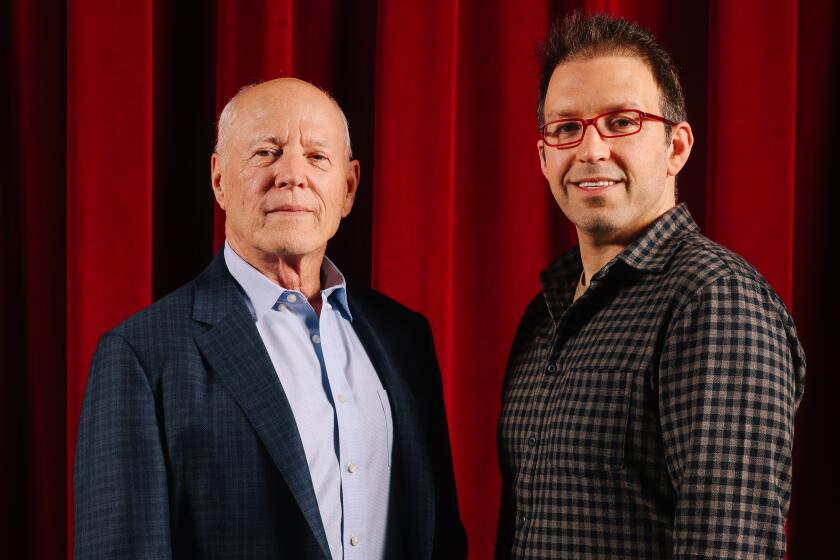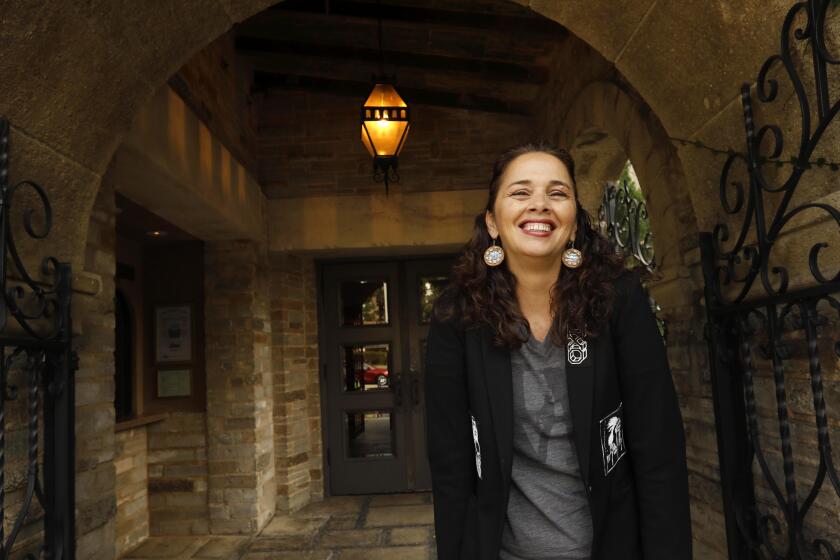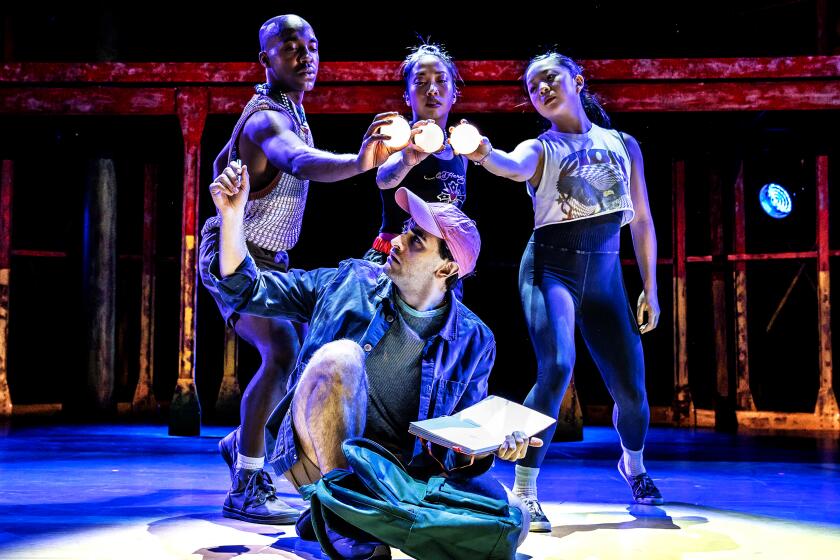Key Chinese exports
Xiao Bai, a 76-year-old composer from Shanghai, labored for 18 years on a single opera. Cheng-Chieh Yu, a 42-year-old L.A.-based choreographer, recently traveled to her hometown, Taipei, where she spent six months creating a work for a Taiwanese dance company. At first glance, it might seem that these two Chinese artists -- of different generations, geographic regions and disciplines -- have little in common.
Bai, Yu and their respective works of art -- both of which will be performed locally this weekend -- belong to the same body of evidence, though: They point to an increasingly vibrant, contemporary and Western-friendly Chinese arts scene, on the mainland and in Taiwan.
Bai’s “Farewell My Concubine,” at Pasadena Civic Auditorium Saturday and Sunday, marries an ancient Chinese tale to the European operatic tradition. Yu’s “Hood, Veil, Shoes,” to be performed today and Saturday at UCLA’s Glorya Kaufman Hall, merges Western contemporary dance, contact improvisation and a postmodern theatricality with Chinese martial arts and a theme suggested by the vicissitudes of urban transit in Taiwan. Both works, which espouse an unmistakably East-meets-West ethos, premiered to packed audiences in China.
“There is an open market now for art in China. Broadway shows are touring there,” says Emily Kuo Vong, the producer of “Farewell My Concubine” and founder of the Chinese American Inter-Cultural Exchange Foundation. “And just look at the Chinese economy. Everything is made in China -- so why not art and why not opera?”
Even in Taiwan, with its history of openness to the West, “there is this new and incredible creative soil,” says choreographer Yu, who left Taipei in 1989 and was struck on her return by “how much had changed. The dancers I worked with were so determined to do contemporary work.”
Speaking from Shanghai, with Kuo Vong acting as interpreter, Bai manages to breach the language gap when, his voice passionate, he expresses his love of Western opera. “Farewell My Concubine,” he says, represents the culmination of a lifelong dream.
“I had always thought that [Western] opera was the grandest of all art forms, so if the Italians and the Germans can have their operas, then why not the Chinese?” he says. “I wanted to put together the tradition of European opera with Chinese history.”
Originally a popular traditional Chinese opera, “Farewell My Concubine” has also served as inspiration for a novel, an Oscar-nominated 1993 film and a Japanese musical set to open this spring. The story dates back more than 2,000 years and tells the tale of a doomed warrior and his loyal concubine.
“It’s a tragic love story, like ‘Romeo and Juliet,’ and I thought it would be good for an opera,” says Bai.
Famous in China for his orchestral compositions and his role as chief conductor of the Shanghai Opera House for about 35 years, Bai collaborated with librettist Wang Jian through an intense correspondence consisting of more than 300 handwritten letters. The result, sung in Mandarin with English subtitles, features lavish sets and a score staunchly in the tradition of Puccini and Verdi.
Genesis of a dream
“I’m a perfectionist,” Bai says in answer to the question of why it took him 18 years to complete the work. “It’s also very difficult to stage a Western opera in China.”
Indeed, the show might not have gone on at all were it not for Kuo Vong, a former student of Bai’s at the Shanghai Conservatory of Music and a successful Dallas-based businesswoman. In 2004, she founded the Dallas Li Sheng Ladies Choir and traveled to China, where she sought out her old professor for conducting advice.
“He started to tell me what he and Wang Jian had created, and then he gave me the music,” she says. “I just couldn’t believe that they accomplished this, without a fax or Internet, just by these handwritten letters.”
Wanting to “help my professor’s dream come true,” Kuo Vong put up the funds for the Beijing production and a six-city U.S. tour. “I’m not doing this to make money,” she says. “I want U.S. audiences to know that China has taken opera to a new level and that, through opera, you can understand Chinese history and culture.”
Like Bai, Cheng-Chieh Yu fell in love with a Western art form -- modern dance. She pursued it first in Taiwan, dancing with the acclaimed Cloud Gate Dance Theater and later in New York. But when she relocated to Los Angeles seven years ago, she started to regularly practice ba gua zhang and began to integrate that Chinese martial art into her choreography while continuing to mine her cultural heritage for subject matter.
“For me, Los Angeles has been a place where you can reflect more, unlike New York or Taiwan, where I’m always going, going, going,” Yu says over coffee at a Venice cafe. “I suppose that living here has made me more focused on looking back into myself, into who I really am.”
Yu was commissioned by the Sun-Shier Dance Theatre of Taiwan to create a work for five women and two men, which became “Hood, Veil, Shoes.” The assignment entailed a sabbatical from her position as an assistant professor of dance and choreography at UCLA and a half-year stay in the Taiwanese capital. From the outset, she knew she wanted to make a dance about gender issues within the context of contemporary Chinese life, and she found potent subject matter in Taipei’s traffic.
“It is such a noisy city, where you can’t avoid human contact,” she says. “It’s full of honking buses, weaving motorcycles. On the subway, people are wearing face masks. Women get harassed on the streets or groped in buses. And you’re not supposed to yell about it -- there’s still this attitude that you asked for it.”
Exploring the ways in which people conduct themselves in traffic led Yu to thinking about the tale of Little Red Riding Hood and “the city as a forest. And I thought about how when I was growing up, women weren’t really driving. Now they are, but many of them are riding these motorcycles called ‘Little Lambs’ that are designed specifically for women. To me, the women on their motorcycles are like Little Red Riding Hoods.”
Yu’s footnotes
The shoes in “Hood, Veil, Shoes” also play a significant role. Wearing red high heels, Yu’s dancers explore a spectrum of movement, including crawling and walking with a runway-model attitude. As she worked with the shoes, Yu had various associations in mind, including the 1948 ballet film “The Red Shoes” and the traditional Chinese practice of female foot binding. Yu is “always doing several things at once in her work,” says Rachel Lee, an associate professor of English, women’s studies and Asian American studies at UCLA who specializes in performance culture and has been following the choreographer’s career. “She’s always delving into gender politics, and she’s always tackling this East-West dynamic, whether it’s through examining cultural practices, geographies or histories. I’ve always found her work brave, political and fascinating.”
Yu’s ideas of fusion proved challenging at times for the Taiwanese dancers, who tended to shy from movement considered traditionally Chinese. “They would do anything I asked of them, but when I tried to get them to do ba gua zhang, they had resistance, though it was subtle,” she says. “They really want to do contemporary movement and were intrigued by contact improv. So I would approach contact improv in a tai chi way, sneaking in the stuff they resisted.”
It remains to be seen how such cross-fertilization of East and West will continue to evolve in the works of artists such as Yu and Bai and how prominent a role China will play as a global exporter of art. But Yu, for one, has high hopes.
“China has become this incredible power economically,” she says. “So it’s only a matter of time for the arts to follow in that direction.”
--
Sun-Shier Dance Theatre
Where: Glorya Kaufman Dance Theater, UCLA
When: 8 p.m. today and Saturday
Price: $15
Contact: (310) 825-2101
or www.tickets.ucla.edu
--
Also
What: “Farewell My Concubine”
Where: Pasadena Civic Auditorium, 300 E. Green St., Pasadena
When: 8 p.m. Saturday and
2 p.m. Sunday
Price: $50 to $200
Contact: (626) 449-7360
or www.thepasadenacivic.com
More to Read
The biggest entertainment stories
Get our big stories about Hollywood, film, television, music, arts, culture and more right in your inbox as soon as they publish.
You may occasionally receive promotional content from the Los Angeles Times.





